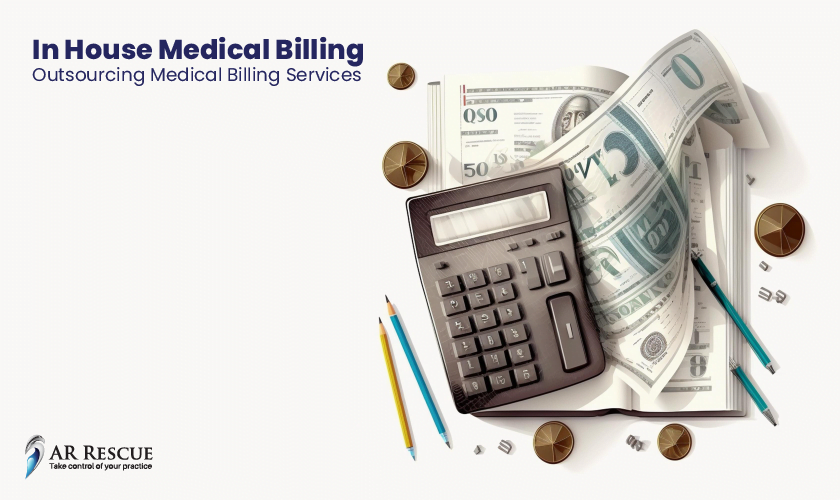As medical billing and coding evolve, healthcare providers look for ways to improve revenue cycle management.
Medical practices must make an important decision about whether to manage medical billing in-house or outsource it.
In healthcare, this is an essential element.
Let’s look at the pros and cons of medical billing in-house versus outsourced.
Table of Contents
In-House Medical Billing
In-house billing is handling medical billing tasks within a healthcare practice or facility.
Instead of outsourcing these tasks to external companies, the practice maintains its billing team to handle coding, claims submission, and payment processing.
Pros of In-House Medical Billing
1. Increased Control and Oversight
When medical billing is managed in-house, healthcare providers have direct control over the entire billing process.
They can closely monitor and manage billing tasks, ensuring accuracy and compliance with industry standards.
A team of in-house professionals allows immediate access to patient records and timely billing-related inquiries.
2. Cutomized Solutions
The billing processes of medical practices can be customized to suit specific needs through in-house billing.
Adaptability allows the practice to align billing procedures with its overall goals and objectives, potentially increasing revenue.
3. Cost Savings for Larger Practices
Managing billing in-house can be cost-effective for large medical practices with substantial billing volumes.
The practice can save on outsourcing costs by avoiding external service fees.
Cons of In-House Medical Billing
1. Resource Intensive
Managing medical billing internally requires dedicated resources and staff.
The practice must invest in training and maintaining a proficient billing team, which can be time-consuming and costly.
2. Limited Expertise
In-house billing staff might not have the same level of expertise as specialized billing companies.
Keeping up with ever-changing healthcare regulations and coding updates can be challenging for a small in-house team.
3. Increased Liability
Any errors made during the billing process can have severe consequences, including financial losses and potential legal issues.
The practice assumes full responsibility for any billing mistakes made in-house.
Outsourcing Medical Billing Services
Healthcare providers outsource their billing and coding processes to an external billing company.
Rather than handling these tasks in-house, the healthcare provider collaborates with a third-party billing service.
Pros of Outsourcing Medical Billing Services
1. Expertise and Specialization
Outsourcing medical billing services to experienced and certified billing companies provides access to a team of professionals well-versed in industry standards and regulations.
These experts ensure accurate coding and maximum reimbursement rates.
2. Cost-Efficiency for Smaller Practices
Smaller medical practices may find outsourcing more cost-effective than maintaining an in-house billing team.
By outsourcing, they can avoid recruitment expenses, training costs, and the need for expensive billing software.
3. Focus on Core Healthcare Activities
Outsourcing billing allows healthcare providers to focus on patient care and core medical activities.
By delegating billing duties to experts, time and resources can be freed up, enhancing overall efficiency.
4. Scalability and Flexibility
During peak periods, billing companies can quickly scale up their resources to handle increased workloads, resulting in timely claim submissions and reimbursements.
Cons of Outsourcing Medical Billing Services
1. Loss of Control
When you outsource medical billing, you give up some control over the billing process.
Despite the billing company’s regular communication, the healthcare provider may not have the same immediate oversight as an in-house team.
2. Possible Communication Issues
A lack of communication between the medical practice and the billing company can lead to misunderstandings and delays in resolving billing-related issues.
Conclusion
In-house medical billing offers increased control and customization but requires significant resources and expertise.
On the other hand, outsourcing medical billing has quite a few benefits.
It provides access to specialized expertise, cost-efficiency for smaller practices, and allows the practice to focus on core healthcare activities.
However, it may lead to reduced control and potential communication challenges.
To make an informed decision, healthcare providers and practices should assess the billing requirements, financial capacity, and long-term objectives.
A hybrid approach could also be explored, considering the benefits of both in-house and outsourcing options.
For instance, the practice can outsource specific billing tasks while maintaining control over critical aspects in-house.
Successful medical billing and coding ultimately contribute to a well-functioning healthcare practice and improved patient experience.
Regardless of the chosen approach, regular monitoring and open communication with the billing team or company are essential to achieve smooth revenue cycle management.
Want accurate and efficient medical billing services in Las Vegas? Get the best care at AR Rescue.
We provide independent billing services and advanced medical billing services to healthcare providers.
With our expertise in outsourcing revenue cycle management and medical coding, we can simplify billing, maximize revenue, and allow you to devote more time to patient care.
Contact us – we would be happy to assist you in improving your medical billing experience.

